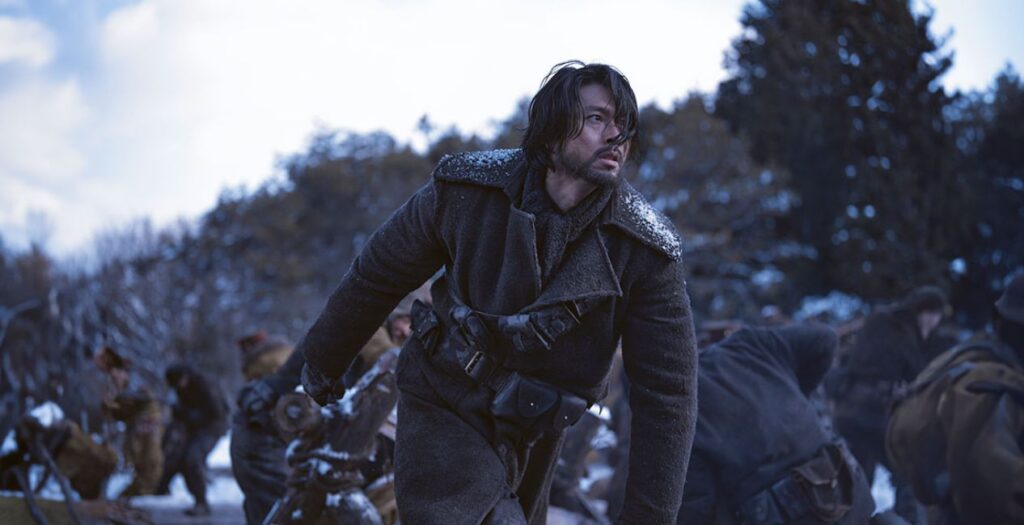Co-written and directed by Woo Min-ho, Harbin provides another example of the director’s natural talent in building tension. Set in 1909 in Japanese-occupied Korea, Harbin focuses on the nation-altering plot to assassinate Itō Hirobumi. Starring Hyun Bin, Jeon Yeo-been, Park Jeong-min, and Lee Dong-wook, the film is saved by the strength of its performances and the beauty of its cinematography. Otherwise, the tale barely scratches the surface, offering a shallow albeit successfully inspiring display of resistance against all odds.
A brief introduction at the beginning of Harbin paints the significance of this small resistance group. It is 1909, four years after Korea was forced to cede over its rights to sovereignty over to Japan. To stand up against Japan is almost akin to death, but for Jung-geun and his comrades, a free Korea means the world. Failure is expected, but loyalty is questioned if it is too convenient. After his kindness leads to his entire regiment being slaughtered by the Japanese, Ahn Jung-geun (Hyun Bin) is on thin ice with the remaining members of the Righteous Army militia.
After this incident, Ahn is placed on a suicide mission to assassinate Itō Hirobumi, the first Japanese Resident-General of Korea. It becomes clear through the Resistance’s efforts on this mission that it has been compromised, with a sub-mission forming to find the mole within their ranks. If they don’t find the mole in time, their chance to eliminate Hirobumi will pass, leaving them with regret. And this team of underdogs refuses to hang onto regret any longer.
At every turn of Harbin, the incredibly unsubtle theme of loyalty is the beating heart of the picture. Ahn’s kindness becomes a danger to the Resistance, with bodily mutilation being used to prove his heart to the cause. Woo Min-ho’s manipulation of tension stokes intrigue once the idea of a mole is introduced, with every character’s paranoia seeping through. Anyone involved in the plot is a suspect, but the natural potential culprits boil down to two given key plot points earlier on.
And it is the plot that drives Harbin, with each day adding further pressure on our band of rebels. The majority of whom are almost forgettable if not for the strength of their performances. The characterization we receive is purely due to what they deliver, not what is conveyed in the screenplay. As the central character (and key executor) of the Hirobumi assassination plot, Ahn is the most fleshed out. Even still, Hyun Bin isn’t given much to go on. As the villain obsessed with finding Ahn, Mori (Park Hoon) is indistinguishable from any other thriller goon, needlessly one-dimensional.
In prioritizing the plot over its characters, in some ways, Harbin fails to put a memorable face onto the resistance. What this group accomplished is nothing short of amazing, with every obstacle thrown at them. They should not have been able to succeed, but they did. Yet, it could not have been achieved without each member of the plot, who frankly are boiled down to their archetypes: “the commander who failed,” “the widow,” “the leader,” “the traitor,” etc. It is a shame to explore a period of history without exploring more about the people who made this history possible.
That’s not to say there wasn’t a chance to fill in the blanks. Woo and screenwriter Kim Kyoung-chan fold in flashback sequences, conveyed in black and white, to explain away reveals. This offers some insight into the characters Kim Sang-hyun (Jo Woo-jin) and Woo Deok-sun (Park Jeong-min), but the execution is rough. The flashbacks put a brake on pacing, making an already busy film feel overcrowded. The scenes themselves are dialogue-heavy, coming across as exposition-heavy and unearned. Explaining a reveal to the audience is less satisfying than letting it naturally unfold.
Harbin succeeds most when taking a beat to pull back. Hong Kyung-pyo‘s camera captures the scale of the situation for the resistance. Whether it’s capturing the cruel beauty of the frozen Tumen River or the dry, barren landscapes on their way to Jilin, the members of the resistance are portrayed as small against a force bigger than them. Kyung-pyo’s visual language speaks volumes without making a sound. Instead, Jo Yeong-wook‘s score punctuates with evocative emotion, almost overwhelming with the reminder of the gravity of the situation.
The takeaway of Harbin is fighting against all odds. Its steady unfolding of tension and captivating performances make it easy to be swept away. Everyone loves to root for the underdog, especially when the stakes are dire. But Woo Min-ho’s prioritizing of the plot over its characters leaves this inspiring, tension-driven tale feeling a little hollow. And that’s a dang shame because, without taking that into account, Harbin is a competent, thrilling film.
Harbin played as a part of the 2024 Toronto International Film Festival.
Harbin (2024)
-
Rating - 6.5/106.5/10
TL;DR
Woo Min-ho’s prioritizing of the plot over its characters leaves this inspiring, tension-driven tale feeling a little hollow. And that’s a dang shame because, without taking that into account, Harbin is a competent, thrilling film.







